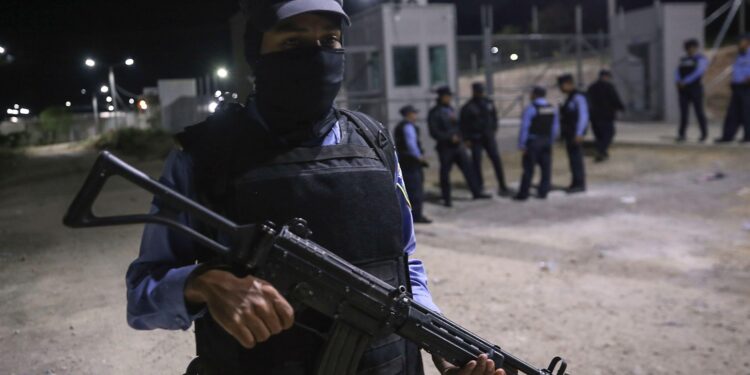Honduras’ Military Police for Public Order (PMOP) reported that in recent operations carried out in prison modules inhabited by gang members, they have seized an arsenal of rifles, pistols, and grenades. The PMOP spokesman, Captain José Coello, detailed that in the Támara Penitentiary Center they seized four AR-15 rifles, an Uzi submachine gun, 38 9mm caliber pistols, and 14 of other calibers, as well as fragmentation grenades and bladed weapons, in addition to transmission devices, drugs, cash, and other prohibited objects.
The Támara prison, located north of Tegucigalpa, is considered the most important in the country, housing some 6,000 inmates, although the specific number of gang members held there has not been disclosed. Firearms and other weapons held by gang members were also seized at the maximum-security La Tolva prison, located east of the capital.
These operations were carried out on the orders of President Xiomara Castro following a violent incident at the Támara women’s prison, where members of the Barrio 18 gang shot and set fire to rivals from the Mara Salvatrucha (MS-13), resulting in 46 deaths.
Honduran authorities consider the country’s prisons to be “crime academies” and have registered more than 1,000 deaths in the last 20 years.
President Castro has ordered the PMOP to take control of all penitentiaries as of July 1, but the operations were surprisingly brought forward and will continue indefinitely. According to the commander of the PMOP, Colonel Fernando Muñoz, the weapons were brought into the prisons by gang members bribing the guards. In addition, PMOP and National Police troops have been deployed in the city of Choloma, where a shooting occurred, leaving 13 dead in a pool hall, leading to the declaration of a curfew. In summary, a series of operations have been carried out in Honduran prisons, resulting in the seizure of a large number of firearms, grenades, and other illegal items.
These actions were ordered by President Castro following a violent incident between gangs in a women’s prison. Authorities consider the country’s prisons to be training centers for crime, and a large contingent of security forces has been deployed to take control of the prisons and curb violence.










